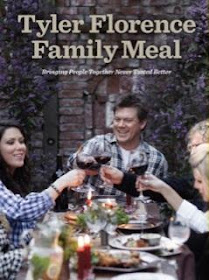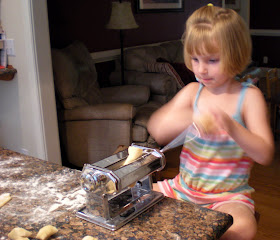 |
| Canned wild caught Alaskan salmon by Lucy Mercer/A Cook and Her Books |
Pinky sweet salmon isn’t the fish of my childhood, that would be the bream that my brother Will would catch at Blanton’s pond near our home in upstate South Carolina. Dad would spread out the Sunday paper on the driveway and clean the fish, saving some for supper, freezing the rest in repurposed cardboard milk cartons. In the kitchen, Mom dipped the fillets in egg wash and cornmeal and fried them up - bream has a distinctly earthy taste and I will always consider it my first fish.
The standby fish in my childhood is salmon from a can. Mom could feed her family of five with one can of salmon and a few pantry ingredients, frying up salmon croquettes. I make salmon croquettes, too, although I’ve adopted my husband’s name for the dish - salmon patties. I don’t know why, maybe it’s a Georgia thing, but that's the way the dish appears on meat-and-three menus around here.
We used to eat salmon fillets and steaks regularly, in the mid-90's heyday of Thursday night’s NBC Must-See TV line-up. I made my killer teriyaki sauce with extra garlic and ginger and heated up the small nonstick skillet I use for scrambling eggs. I coated the pan with just a bit of oil, slid the fillet in, let it sizzle on both sides and poured the teriyaki over all, being careful not to let it cook too much, or the sauce, which is half sugar, would burn to an acrid mess. This was
B(efore)
K(ids), so my husband and I would eat the salmon with rice and stir-fried broccoli while watching “Seinfeld” and whatever came next. (Followed by "Friends" and whatever came next. Followed by "ER.")
Here’s the thing: I went to the supermarket today to buy salmon for my salmon in a small pan with teriyaki. At the seafood counter, the price was $8.99 a pound. On sale. Let’s be frank, here, Francis, (I’ve wanted to write that for so long): it’s the end of the month, one of my daughters had a cavity filled, we have check-ups and birthdays this month, and despite this week's headline that the recession ended 14 months ago, I just didn’t feel up to paying $8.99 a pound (on sale) for fresh salmon, so I headed to my neighborhood dollar store.
Dollar stores are hot - did you know that? At least, according to this
New York Times article about how stores such as Dollar General stock goods in smaller packages that are less expensive to appeal to customers living paycheck to paycheck. At Dollar General, I paid $2.25 for a 14.75 ounce can of Alaskan wild-caught salmon. The same can at the grocery store cost $2.59.
Here are my salmon patties. I've tried a few recipes over the years, mostly from the back of the can, but I always go back to the late 80's Pillsbury Cookbook version, with just a few adaptations. Pillsbury was my bridal shower cookbook, and my beaten-up, stained copy is missing both covers, but, thank goodness, the recipes still work.
 |
| Salmon Patties by Lucy Mercer/A Cook and Her Books |
Salmon Patties
These can be seasoned with fresh herbs, if you happen to have them on hand or in the garden. Dill is upscale, fresh parsley is fine, and dried parsley from the spice drawer is authentic to my childhood memories.
Yield: 6 patties
1 (15 oz.) can salmon, undrained
4 cups fresh bread crumbs from 8 slices white sandwich bread, divided
2 eggs
2 tsp. lemon juice
1 tsp. dried parsley
1/2 small onion, finely chopped
1/4 tsp. salt
1/8 tsp. pepper
canola oil for frying
1. In a bowl, place salmon. Pick through fish, pulling out skin and icky dark stuff. Mash the bones between your fingers (the bones are supposed to be good for you - all that calcium).
2. Add remaining ingredients, until you have a fairly wet mixture that will hold its shape. Pour remaining bread crumbs into a pie dish. Shape mixture into 6 medium patties, about 1 inch thick and 3 inches across. Place patties in bread crumbs and gently coat with crumbs on both sides.
3. Pour oil into medium skillet and heat until it comes up to frying temperature. I drop a few bread crumbs into the hot oil to see if they will sizzle.
4. Fry the patties in the oil until golden brown, about 3 or 4 minutes on the first side, and a minute less on the second side. Drain on a paper towel-lined plate.
 |
| Pantry staples by Lucy Mercer/A Cook and Her Books |
I was at the Dollar General, I planned the menu - homemade macaroni and cheese, a black-eyed pea salad with canned peas and dessert using canned peaches, evaporated milk and butterscotch morsels. I spent $9.63, which is just about the same as I would have spent on one pound of fresh salmon at the grocery store.
 |
| Homemade Macaroni and Cheese by Lucy Mercer/A Cook and Her Books |
Creamy Macaroni and Cheese
This is not one of those complicated four-cheese dishes with a crumb crust. This is an everyday stovetop recipe adapted from The Pillsbury Cookbook. It's very simple to make, and a little lighter than regular mac and cheese, because there's no butter. Be sure to use whole milk, though, for a creamy texture.
8 oz. uncooked elbow macaroni
1/4 cup flour
2 cups milk
8 oz. (2 cups) shredded American cheese
Freshly ground black pepper
1. Cook macaroni to desired doneness according to package directions. Drain and rinse with hot water.
2. In a jar with a tight-fitting lid, combine flour and 1 cup of the milk. Shake until well-blended (a child is useful for this part). Pour mixture into a medium nontick pan; add remaining milk and whisk until mixture boils and thickens.
3. Add cheese and continue cooking until cheese is melted, stirring constantly. Add cooked macaroni and pepper. Serve.
 |
| Black-Eyed Peas Vinaigrette by Lucy Mercer/A Cook and Her Books |
Black-Eyed Peas Vinaigrette
1 (15.5 oz.) can black-eyed peas, drained
1/4 cup diced onion
1/4 cup diced red pepper
1 clove garlic, minced
1-inch piece ginger, minced
2 tablespoons Dijon mustard
2 tablespoons red wine vinegar
1 teaspoon sugar
1/3 cup extra-virgin olive oil
Salt and pepper to taste
1. In a medium bowl, combine peas, onion, red pepper, garlic and ginger.
2. In a separate bowl, whisk together vinegar, mustard and sugar. Slowly whisk in olive oil. Season with salt and pepper and pour over salad.
 |
| Butterscotch Peach Tart by Lucy Mercer/A Cook and Her Books |
I finished the menu with a peach tart, a recipe my Mom wrote out countless years ago. I've always wanted to try it.
Butterscotch Peach Tart
Base
1 1/2 cups all-purpose flour
1 teaspoon salt
1/4 cup grated Cheddar cheese
1/2 cup shortening.
1. Preheat oven to 350°. Combine flour, salt and cheese in a medium bowl. Cut in shortening and sprinkle in 5 or 6 tablespoons of cold water over all. Mix into a dough and spread in a springform pan. Bake for 10 minutes. Remove from oven and let cool.
Filling, part 1
1 cup butterscotch morsels
4 tablespoons evaporated milk
1. In a microwave safe bowl, place chips and zap for 1 minute. Remove from oven and add evaporated milk. Stir until smooth, returning to microwave oven for 20 second intervals. Spread over crust.
Filling, part 2
1 (29 oz.) can sliced peaches, drained, 1/4 cup of juice reserved
1/4 cup sugar
1/4 cup brown sugar
1 tablespoon corn starch
1/2 teaspoon cinnamon
1/2 teaspoon nutmeg
1. In a small bowl, combine all ingredients. Neatly arrange peach slices over crust and pour remaining juice overall.
2. Bake at 425° for 30 minutes. Let cool and serve.
 |
| Pantry staples by Lucy Mercer/A Cook and Her Books |
The Dollar General store photo is from the Dollar General website.
All other text and images © Lucy Mercer, 2010.


































